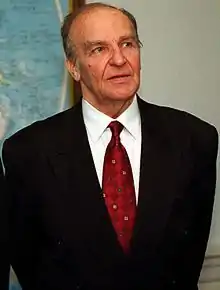Turks in Bosnia and Herzegovina
The Turks in Bosnia and Herzegovina (Turkish: Bosna-Hersek'teki Türkler), also known as Bosnian Turks, are ethnic Turks who form the oldest ethnic minority in Bosnia and Herzegovina.[2] The Turkish community began to settle in the region in the 15th century under Ottoman rule, however many Turks emigrated to Turkey when Bosnia and Herzegovina came under Austro-Hungarian rule.[2]
| Total population | |
|---|---|
| 1,108 (2013 census)[1] | |
| Languages | |
| Turkish and Bosnian | |
| Religion | |
| Sunni Islam |
History
When the Ottoman Empire conquered the Bosnian kingdom in 1463, a significant Turkish community arrived in the region. The Turkish community grew steadily throughout the Ottoman rule of Bosnia; however, after the Ottomans were defeated in the Balkan Wars (1912–13), the majority of Turks, along with other Muslims living in the region, left their homes and migrated to Turkey as "Muhacirs" (Muslim refugees from non-Muslim countries).
Culture
In 2003 the Parliamentary Assembly of Bosnia and Herzegovina adopted the Law on the Protection of Rights of Members of National Minorities. According to the Law, the Turkish minority's cultural, religious, educational, social, economic, and political freedoms are protected by the State.[3]
Language
The Turkish language is officially recognized as a minority language of Bosnia and Herzegovina in accordance with the European Charter for Regional or Minority Languages, under Article 2, paragraph 2, of the 2010 ratification.[4]
According to the 2013 census, 4,233 people (3200 males, 1033 females), 2000 of whom lived in the Sarajevo Canton, declared Turkish as their mother tongue whereas 1,108 (738 males, 370 females), 970 of whom lived in the Sarajevo Canton, declared themselves as ethnic Turks.[1]
Community
Turkish community in Bosnia is well provided, due to historical strong bond between both countries.
Demographics
According to the 1991 population census 267 Turks were living in Bosnia and Herzegovina,[6] while the 2013 Bosnian census gave a number of 1,108, almost all in the Federation of Bosnia and Herzegovina (1,097 people).[7] More than eighty percent of all Turks in Bosnia and Herzegovina live in the capital Sarajevo.
Notable people

- Alija Izetbegović, president of Bosnia and Herzegovina (Turkish grandmother)[8]
- Children:
- Bakir Izetbegović, politician
- Aldin Mustafić, a member of the Turkish minority in Bosnia and Herzegovina - wrote a book on Bosnian language in Arabic script entitled "The Epochs of Arabic phonetic thoughts and Arebica", as part of the influence of Turkish culture in the region - i.e. in Bosnia and Herzegovina.[9]
See also
References
- "1. Stanovništvo prema etničkoj/nacionalnoj pripadnosti - detaljna klasifikacija". Popis.gov.ba.
- Council of Europe. "European Charter for Regional or Minority Languages: Bosnia and HerzegovinaLANGUAGES" (PDF). Retrieved 2011-10-16.
- OSCE. "National Minorities in BiH". Retrieved 2013-12-29.
- Council of Europe. "List of declarations made with respect to treaty No. 148". Retrieved 2013-12-21.
- Minahan, James (1998), Miniature Empires: A Historical Dictionary of the Newly Independent States, Greenwood Publishing Group, p. 46, ISBN 0313306109
- Federal Office of Statistics. "Population grouped according to ethnicity, by censuses 1961-1991". Archived from the original on 2011-09-26. Retrieved 2011-10-16.
- Census 2013
- Carmichael, Cathie (2015), A Concise History of Bosnia, Greenwood Publishing Group, p. 178, ISBN 1316395294
- http://www.bastinaobjave.com/otvoreni-defter-202/aldin-mustafic/1562-predgovor-knjige-epohe-fonetske-misli-kod-arapa